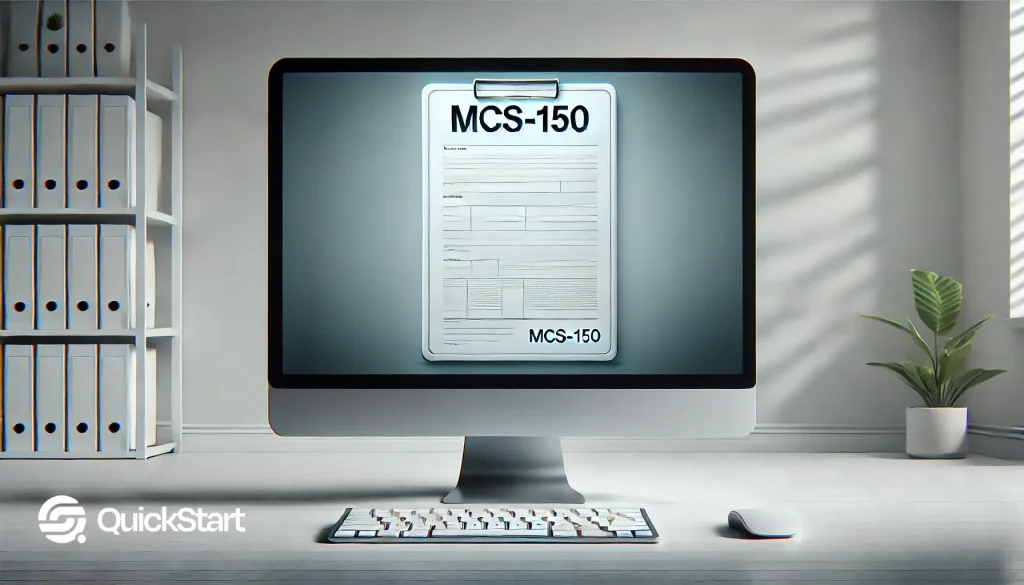What is the MCS-150 Form?
The MCS-150 form is an essential document that motor carriers must file with the FMCSA. The form provides information on trucking operations, such as fleet size, type of cargo, and other critical data. This data helps the FMCSA track carriers and ensure their regulatory compliance.
The MCS-150 should be updated every two years, even if there are no changes to the carrier’s business operations. The update helps keep accurate records of carriers, ensuring their authority and approvals are valid.
Filing or updating the MCS-150 form is essential for maintaining a carrier’s active status. Without timely updates, carriers risk losing their operational authority or facing fines. In addition, the form must be submitted whenever there is a significant change in a carrier’s information.
Who Needs to File the MCS-150 Form?
All motor carries involved in interstate commerce are obliged to file the MCS-150 form. This applies to business that transport goods, passengers, or hazardous materials, regardless of the size and weight of the vehicle or whether a carrier operates as a private carrier of for-hire services.
In addition, there are other businesses that may be required to file the MCS-150. In particular, it covers freight forwarders, brokers, and those handling the transport of hazardous materials, even in small quantities. With it, they can ensure their operating authority remains valid.
When Do You Need to File or Update the MCS-150 Form?

The timing for filing and updating the MCS-150 form is one of the main aspects for staying compliant. This prevents fines, operational disruptions, and compliance issues.
There are several critical scenarios when the form is required to ensure your operations are smooth and adherent.
- New registration. When starting a new business, you need to apply for a U.S. Department of Transportation (USDOT) number. To do this, you have to file the MCS-150 form. This step is also needed to activate your operating authority and start legal operations in interstate commerce. Without the form, you won’t be able to legally operate in the trucking industry.
- Biennial update. You must submit an MCS-150 update regularly, every two years. The specific month when the update is due depends on the last two digits of your USDOT number. In particular, you must fine in an even-numbered year if your USDOT number ends in an even. If you fail to update your MCS-150, you can face fines, suspension of your operating authority, or the revocation of your USDOT number.
- Significant changes. In addition to regular updates, you have to update the MCS-150 form in case of significant changes to your operations. This can include changing your fleet’s volume, an expanding or reducing your operations, shifting the types of cargo you transport, or updating your contact information or business address. Filing an update provides you the FMCSA with accurate, up-to-date information about your business.
- Reinstatement of authority. If you faced with revoking or suspending your operating authority due to non-compliance, failure to update the MCS-150 form, or other reasons, you will have to submit an updated MCS-150 form. With it, you can resume legal operations after addressing the issues that led to the suspension or revocation.
- Voluntary changes. Even if it’s not time for your biennial update, you can voluntarily file an MCS-150 update to reflect small changes or to confirm that the FMCSA has accurate information. This can be helpful if you want to ensure accurateness of all data before an inspection or audit.
- Business closer or operating cease. If your business is closing or you plan to stop operating, you have to notify the FMCSA by the MCS-150 form. This step will ensure your USDOT number is deactivated correctly and you won’t face penalties.
Why It’s Important to Fuile Your MCS-150 on Time
Filing your MCS-150 form on time is essential. This impacts your operational continuity and reputation. Missing deadlines or failing to update can lead to consequences, such as legal penalties and fines. The FMCSA sets strict guidelines for submitting and updating the MCS-150 for.
In case on the severity, fines can quickly add up, affecting your operations. You should monitor your schedule accurately to ensure full compliance and avoid unnecessary expenses.
- Maintaining operating authority. The MCS-150 form is a vital component for maintaining your active operating status with the FMCSA. If you miss filing or updating deadlines, your operating authority can be suspended. Thus, you wouldn’t be able to operate your vehicles legally until the issue is resolved. In this case, you could face lost business opportunities, delivery delays, and a loss of client trust.
- Accurate data for safety audits and inspections. The FMCSA uses the data from your MCS-150 form to access and monitor the safety practices you implement. Filing the form on time ensures that the FMCSA has updated and accurate data. This is essential for any safety audits, inspections, or reviews of your operations. Outdated information can provoke fines or non-compliance.
- Avoiding operational delays. If you fail to submit or update your MCS-150 form, the FMCSA may revoke your USDOT number or place your operations in an inactive status. This can result in your vehicles grounding until the form is submitted and your status is renewed. Such delays can have a ripple effect, affecting delivery schedules, customer satisfaction, and overall profitability.
- Maintaining industry reputation. The trucking sector requires constant reliability and compliance. Filing all necessary documents, including the MCS-150 form, on time demonstrated your reliability and adherence to federal regulations. Consistent compliance also increases trust of your clients, business partners, and insurance providers.
- Streamlining insurance and licensing requirements. Many insurance providers and state licensing agencies cross-check your MCS-150 filing status. Missed deadlines or inaccurateness can complicate the process of securing or renewing your insurance and operating permits.
How to File the MCS-150 Form
Filing the MCS-150 form is a straightforward process. However, it’s important to follow the correct steps. This will help ensure your submission is accepted and processed quickly.
- Determine your filing method. There are two main options for filing the MCS-150 form. You can submit it online on the FMCSA’s website or in a paper form by mail. Online filing is the most efficient method as it provides real time updates and instant confirmation. To submit your MCS-150 in a paper form, you have to download the sample from the FMCSA website and send it to their designated address.
- Gather your business information. Before starting the filing process, ensure you have all the necessary information. This must include your USDOT number, legal business name, DBA (Doing Business As) name, mailing address, and details about your fleet, such as size and type of vehicles. if you want to update your form, ensure you have accurate information on recent changes.
- Access the FMCSA online portal. If you decide to file online, visit the FMCSA’s Unified Registration system (URS) portal. For that, you need to log in with your USDOT number and PIN. Then, follow the prompts to submit a new registration or update an existing form.
- Complete and submit the form. You need to provide detailed information about your operations, such as the classification of your business, the type of cargo you ship. Make sure you fill all fields to avoid any delays in processing. After completing the form, submit it through the FMCSA’s website or main to its designated office.
- Monitor your status. The FMCSA usually updates the carrier’s status within a few business days for online filings and longer for mailed-in forms. You can check your filing status using the FMCSA Safety and Fitness electronic Records (SAFER) system. It will show if your application was accepted.
- Keep a copy for your records. Always keep a copy of the files MCS-150 form for your business records, whether you submit a new one or update the existing information. This documentation may be required for future references or during audits, inspections, or when applying for new permits and licenses.
What Information is Required for the MCS-150 Form?
You should ensure all information in the form is accurate. This will help the FMCSA maintain up-to-date record on your operations and reduce the risk of facing fines or legal penalties.
USDOT number. You have to provide your USDOT number on the form. New applicants will obtain their USDOT number upon submission of the form. This helps the FMCSA identify and track your business operations.
- Legal and DBA name. You mist provide the full legal name of your business entity registered with state and federal authorities. DBA name must be included if you operate under a different name.
- Business address. The MCS-150 form must include the physical address of your company’s principal place of business. This is required to be the location where you manage your day-to-day operations. in addition, you have to provide a mailing address if it differs from the physical location.
- Type of operation. You must also indicate the nature of your business operations. this can include whether you’re a for-hire carrier, private carrier, freight forwarder, or broker. It’s necessary to specify whether you operate within interstate commerce or within a single state.
- Cargo classification. The other section is the types of cargo you’re authorized to carry. This can range from general freight to specialized goods, such as hazardous materials, refrigerated products. In case of hazardous materials, you need also provide the appropriate classifications.
- Fleet size. The MCS-150 form also requires the total number of vehicles in your fleet. This includes all motor vehicles, such as trucks, tractors, and trailers. It’s necessary to differentiate vehicles that operate in interstate commerce and those used for intrastate transport.
- Driver information. Provide data on the number of drivers your company employs. Here, you also need to identify how many drivers operate across state lines and exclusively in only one state.
- Safety certification. Certify that your operations comply with federal safety standards. This includes a confirmation of regular vehicle inspections, driver qualifications, and compliance with hours of service (HOS) regulations. Ensure all information is accurate for correct and prompt evaluation.
- Company contact information. The FMCSA requires you to provide a point of contact for your business. Usually, it’s a person responsible for managing regulatory compliance. You need to provide their name, phone number, and email address.
The Role of the FMCSA and CSA in MCS-150 Compliance
The FMCSA is critical in enforcing MCS-150 compliance, ensuring motor carriers operate within federal guidelines and implement necessary safety practices. The FMCSA aimd to reduce crashes, injuries, and fatalities. With information gathered in the MCS-150 form, the FMCSA maintains accurate records on the size, scope, and operations of every carrier.
Regular filings and updates ensure constant compliance with safety standards. If a carrier fails to meet federal and state requirements, the FMCSA has the authority to revoke operating authority, improse fines, or ttake other corrective actions.
The MCS-150 filing process is linked to the FMCSA’s Compliance, Safety, Accountability (CSA) program. It’s a safety monitoring system that contains data from roadside inspections, crash reports, and MCS-150 form. This allows to calculate a Safety Measurement System (SMS) score of motor carriers.
This helps determine a safety performance of the industry participants. The SMS score is used to prioritize carriers for safety interventions. Higher scores can lead to more frequent inspections and audits or corrective action from the FMCSA.
The integration of the MCS-150 data and the CSA program allows the FMCSA to better identify high-risk carriers and drivers. Then, it can impose enforcement actions, such as safety audits. Compliance reviews, and ont-of-service orders in severe cases.
The FMCSA uses the MCS-150 form and CSA scores to track and evaluate safety performance of trucking businesses. Companies that consistently file accurate MCS-150 forms and maintain strong safety records are less likely to face penalties or legal issues.
How to Check Your MCS-150 Status
Staying updated on your MCS-150 filing status is essential for ensuring your constant compliance. With it, you can avoid any potential compliance issues and ensure your operating authority is active.
- Visit the FMCSA website. The easiest way to check your MCS-150 status is through the SAFER System managed by the FMCSA. The platform provides information about your business, such as USOT number, operating status, and compliance history.
- Enter your USDOT number or company name. You can find your status by entering your USDOT number or the name of your company on the SAFER website. The system will generate a report containing details of your operations
- Review your status. The SAFER report will display your MCS-150 status, including a due date for an update. It will also show your operating status, your active approvals, and possible compliance issues. If any red flags or alerts, you must address them immediately to avoid disruptions.
- Use the FMCSA portal. For more detailed information on your MCS-150 status, you can use the FMCSA portal. Log in with the use of your USDOT number and PIN. The platform provides insights on your compliance history, enforcement actions, safety ratings, and pending updates.
- Verify contact information. While checking your status, verify that all the contact and business information is accurate. In case of any discrepancies, you should file an MCS-150 update to correct the information.
Conclusion
Filing and updating the MCS-150 form on time is a key component in maintaining the legal and operational integrity in the trucking industry. With timely updates and accurate information, drivers and carriers can avoid costly penalties, ensure their operating authority is active, and provide accurate data for audits and inspections.
By actively managing your MCS-150 status, you can safeguard your business from legal penalties and potential disruptions and enhance your reputation as a reliable and compliant business. Thus, the MCS-150 form is a foundational element in the broad framework of federal safety and regulatory oversight.




